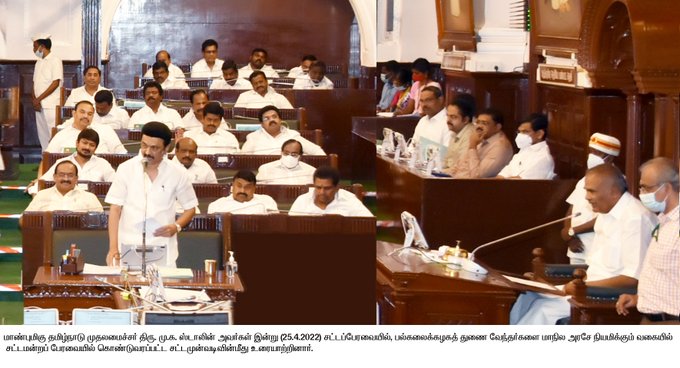CHENNAI, APRIL 25

After Maharashtra, West Bengal, Telangana and Kerala states sought to vest the government with more powers in the appointment of Vice-Chancellors to the State universities, the Tamil Nadu government on Monday introduced in the Assembly a Bill that seeks to take over the Governor’s power to appoint vice-chancellors to universities, with Chief Minister M K Stalin pointing to the state’s powers on this front in Gujarat, home state of Prime Minister Narendra Modi.
The legislation was introduced by Higher Education Minister Dr K Ponmudi on a day Governor R N Ravi inaugurated a two-day conference of vice-chancellors of state, central and private universities in Ooty.
Speaking on the legislation, Chief Minister Stalin said the state government’s lack of power to appoint vice-chancellors impacts higher education in the state.
பல்கலைக்கழகத் துணை வேந்தர்களை மாநில அரசே நியமிக்கும் வகையில் தமிழ்நாடு சட்டமன்றப் பேரவையில் கொண்டுவரப்பட்ட சட்டமுன்வடிவின்மீது, மாண்புமிகு முதலமைச்சர் திரு.மு.க.ஸ்டாலின் அவர்கள் ஆற்றிய உரை#CMMKSTALIN | #TN_Assembly_Demand_2022 #TNDIPR | @CMOTamilnadu@mkstalin @mp_saminathan pic.twitter.com/atAMdfNZVl
— TN DIPR (@TNDIPRNEWS) April 25, 2022
“By convention, the Governor appoints vice-chancellors in consultation with the state government, but over the past four years, a new trend has emerged – of Governors acting as if it’s their prerogative,” he said, adding that this “disrespects the elected government” and is “against the philosophy of people’s rule”.
The Chief Minister said the current practice leads to “confusion” in the administration of universities.
Stalin also pointed to the report of a commission headed by former Chief Justice Madan Mohan Punchhi on centre-state relations – the 2010 report had recommended removal of the Governor from the post of chancellor of universities.
“Even in Prime Minister’s (Narendra Modi) state Gujarat, one of the three candidates recommended by the state government’s search committee is appointed vice-chancellor,” Stalin said.
Opposition parties AIADMK and its ally BJP have opposed the legislation.












